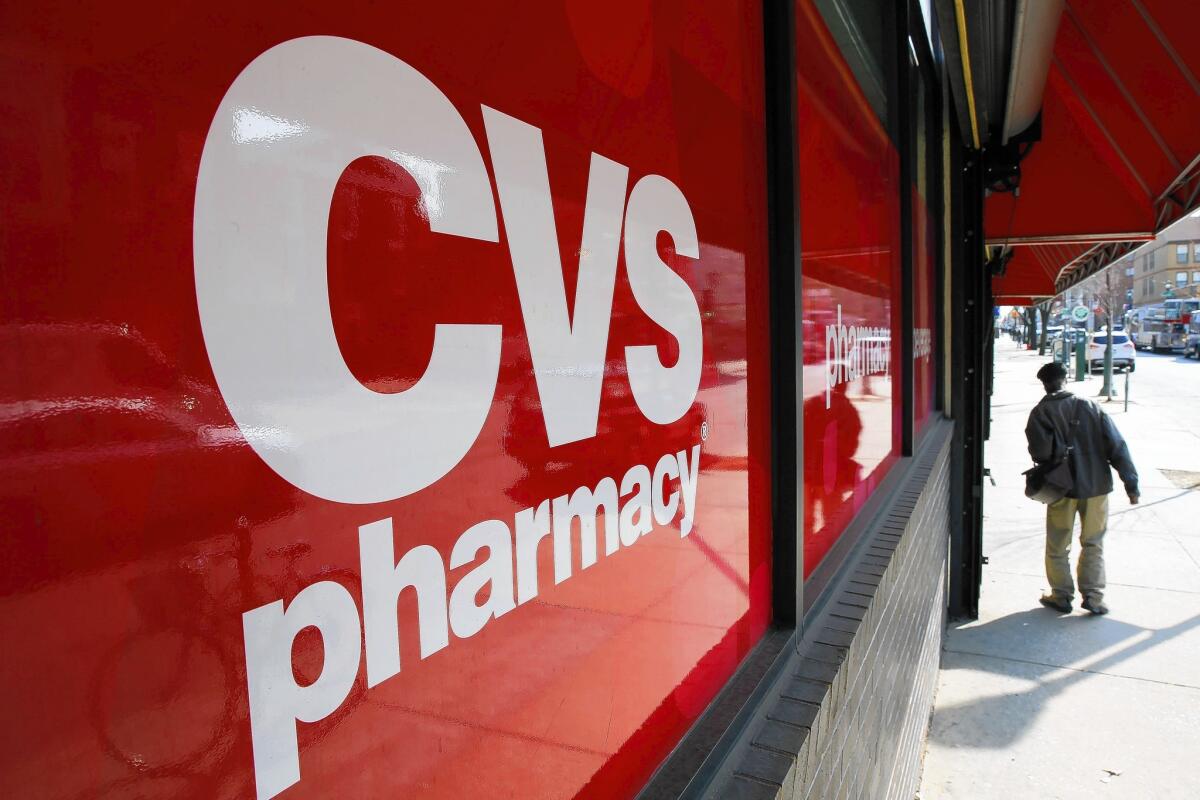CVS kicks the tobacco habit

- Share via
The nation’s No. 2 drugstore operator finally kicked the habit.
CVS plans to announce Wednesday that it has pulled all remaining cigarettes, cigars, smokeless tobacco and other tobacco products from each of its 7,700 pharmacies nationwide.
The company, long known as CVS Caremark Corp., unveiled plans to rebrand as CVS Health, a clear nod to the broader role it hopes to play in the healthcare market.
The move to go tobacco free, which comes a month earlier than planned, carries a substantial risk to CVS’ bottom line but also the potential for a long-term competitive advantage over its peers, particularly Walgreen Co., the nation’s largest pharmacy retailer.
“We believe this reflects our broader healthcare commitment,” said Larry Merlo, the company’s chief executive officer. “What this says about CVS is that we’re a pharmacy innovation company that is at the forefront of a changing healthcare landscape, and it helps us to play a bigger role in healthcare.”
The company, the first major pharmacy to undertake such a ban, first announced the plans in February.
CVS estimates that it will forego about $1.5 billion in annual tobacco sales and another $500 million in associated purchases from people who visit pharmacies primarily to buy cigarettes or chewing tobacco.
But, Merlo said, getting out of tobacco clears up a “contradiction” and removes a “growing obstacle” for the company as it pushes deeper into healthcare.
Eliminating tobacco already has helped with some negotiations, he said.
CVS, based in Woonsocket, R.I., leads the nation with about 900 walk-in clinics, which are staffed to treat minor ailments, administer vaccines and help patients manage chronic illnesses like hypertension and diabetes.
It also has been seeking more partnerships with hospitals, health systems and physicians to manage the healthcare of groups of patients.
Such arrangements, which are being adopted by Medicare, Medicaid and private insurers, in some cases call for groups of providers to share in savings they’re able to produce by keeping patients healthier and their healthcare costs low.
A care network in which patients would be directed into a pharmacy where they could buy cigarettes while picking up their prescription began to make less sense for some health system executives, said Dr. Troy Brennan, CVS’ chief medical officer.
“This shows them we’re in healthcare to stay, and we’re really serious about managing patient care and population health,” Brennan said.
Like CVS, Walgreen for years has faced criticism from health and advocacy groups regarding its policy of selling tobacco products. It also is amid a transformation into a more healthcare-focused company.
Still, its policy on selling tobacco has not changed.
“We believe that if the goal is to truly reduce tobacco use in America, then the most effective thing retail pharmacies can do is address the root causes and help smokers quit,” Walgreen said in a statement. “A retail pharmacy ban on tobacco sales would have little to no significant impact on actually reducing the use of tobacco.”
Both Walgreen and CVS have smoking-cessation programs.
Still, about 18% of American adults smoke, a number that hasn’t moved significantly in a decade.
Groups including the Campaign for Tobacco-Free Kids and American Lung Assn. praised CVS’ move and called upon other retailers to follow suit.
“We feel it’s a very important move for a retail pharmacy to take tobacco out of their stores,” said Harold Wimmer, the national president and chief executive officer of the American Lung Assn. “We feel this gives us another opportunity to go back to other retail pharmacies and encourage them to do the same.”
More to Read
Inside the business of entertainment
The Wide Shot brings you news, analysis and insights on everything from streaming wars to production — and what it all means for the future.
You may occasionally receive promotional content from the Los Angeles Times.










